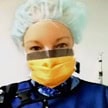-
Asked by Chris to Jonathan, Kellie, Kevin, Melissa, Stephanie on 23 Apr 2016.0
-
Stephanie Moon answered on 23 Apr 2016:
Hi 923hemb24–
Yes definitely! There are a lot of specialized scientists and technicians that help with my research. For example, the last study we published was done with our laboratory group and another laboratory group. Our group did experiments using human cells infected with West Nile virus and Dengue virus, and the other laboratory worked with live mosquitoes that they infected with West Nile virus to study. Each lab has its own expertise (meaning they know how to do specific experiments and understand how to analyze data in a given system) and equipment that can be very expensive- so it’s a good idea to work with experts when you are trying to answer a specific research question.
-
-
Kevin Baker answered on 23 Apr 2016:
My lab is filled with experts in the field, each with their own talent and skills. But part of having that talent is being able to teach others to do those things. One person in my lab is great with presenting data as well as other things. I have never seen such beautiful PowerPoints and posters. But she takes time to sit with you and show you how to do things. Sure there are some things I do not need to learn because someone else can do it faster than me, but those are very rare. Science is all about team work.
-
Kellie Jaremko answered on 23 Apr 2016:
Yes! The best thing about science and medicine is working together with many experts in different fields and skills. This makes for better studies and better patient care.
In my current research I work with an acute pain specialist that has treated patients for >20 years, and a statistician to help me analyze the data. When I worked in a lab we had people that were able to record electrical activity from neurons (brain cells). This is a very complex skill but their help allowed us to get more information more precisely than we could have without their special skills.
-
Melissa Wilson Sayres answered on 24 Apr 2016:
My current position is as an Assistant Professor. My job consists of doing research, teaching, and service. There are certainly aspects of research that require collaboration (sample collection, especially), and aspects of service (coordinating with schools, for example), that require additional partnerships. There are a lot of aspects of being a team-player that are beneficial to being a successful scientist.
-
Jonathan Jackson answered on 25 Apr 2016:
Oh goodness, yes. I think the idea of a single scientist pondering alone in a huge laboratory is a thing of the past. These days, all kinds of special people with special skills work together to make good science happen. It’s important because in my training as a neuroscientist, I don’t often understand the fine details of nuclear physics, for example. So we need a physicist who knows all about that world to help us look at the brain in new ways. The world of science is definitely team-based these days, for sure!
Related Questions
How is science used in peoples every-day lives?
what kind of stuff are the old people trying to remember
What is your favorite thing to learn about at your job?
If you could choose between the other four scientist jobs, which one would you choose?
Do old people have developed brains or less developed brains?






Comments